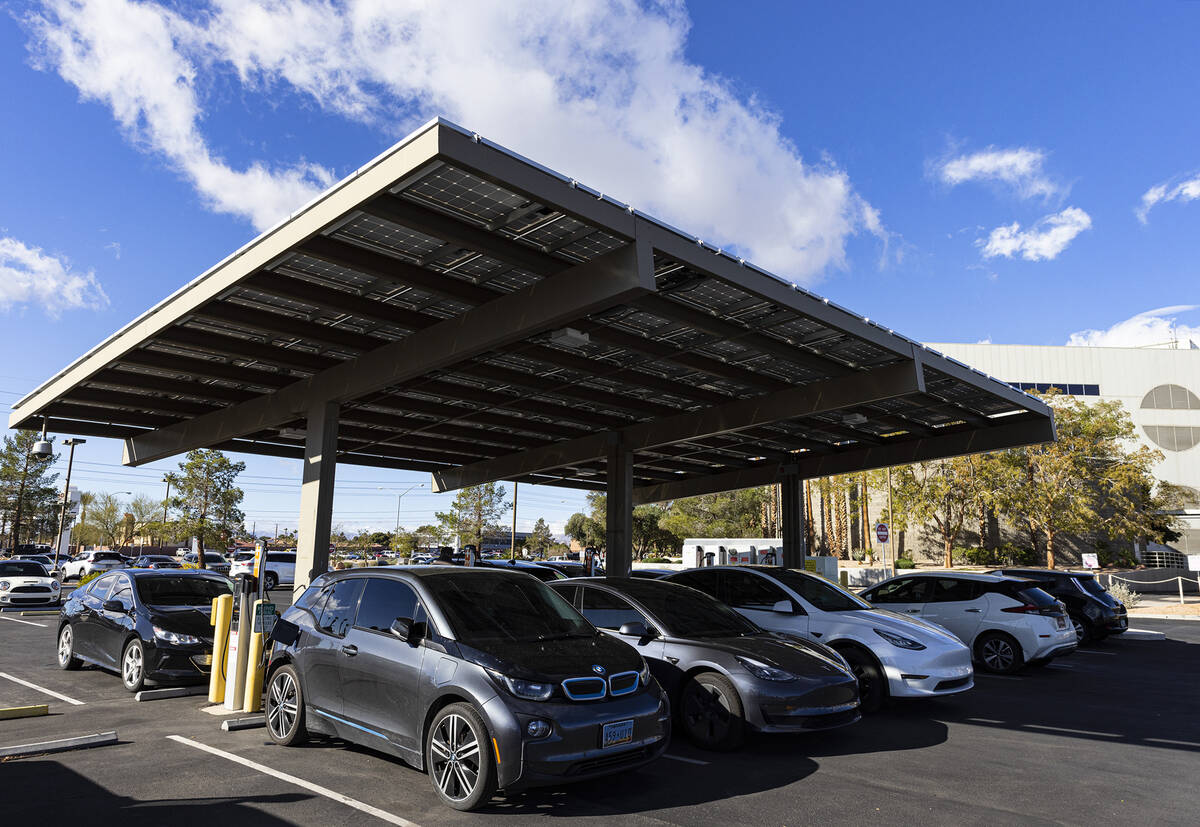New laws incentivize use of zero-emission vehicles
Nevada lawmakers want to encourage the adoption of zero emission vehicles in the private and public sectors and passed two bills this year in support of that goal.
One of the bills was Assembly Bill 184, which provides vouchers to businesses that buy medium and heavy-duty zero emission vehicles. The other is Assembly Bill 262, which directs state government agencies to give preference to vehicles that minimize emissions and total costs of maintenance.
Both bills were sponsored by Assemblyman Howard Watts, D-Las Vegas, and received some bipartisan support.
Incentive program
The Clean Trucks and Buses Incentive program created by AB 184 provides vouchers ranging from $20,000 to $175,000 to replace medium and heavy-duty vehicles owned by businesses, with larger voucher amounts going for replacing larger vehicles. Medium and heavy-duty vehicles are classified based on weight and cover vehicles that weigh over 8,500 pounds to over 60,000 pounds.
The voucher amounts can increase if the applicant is a small business owned by a minority, a veteran, a woman, a member of the LGBTQ community, or a resident of an Indian reservation.
About $4 million a year will be used to fund these vouchers and the program will be handled by the Nevada Division of Environmental Protection, according to Watts.
Watts said the measure can create incentives for the private sector to transition away from gas-powered vehicles and can have a big impact on pollution. He estimates the program can replace dozens of vehicles per year.
“Even though (medium and heavy-duty vehicles) make up about 5 percent of the vehicles on the road, they make up, depending on which type of pollution you’re talking about, 30 to 50 percent of vehicle pollution,” he said. “If we can replace and take one of older, dirtier vehicles off the road and replace it with one that has zero tailpipe emissions, that has a far bigger impact than taking several individual cars off the road.”
The U.S. Environmental Protection Agency estimated that in 2021 medium and heavy-duty vehicles contributed 23 percent of the greenhouse gas emissions in the U.S. caused by the transportation sector, while light-duty vehicles made up 58 percent of transportation emissions. The transportation sector was the largest contributor to greenhouse gas emissions and was responsible for 29 percent of the country’s total emissions.
AB 184 was supported by the Nevada Trucking Association since it provides enough funding to get small businesses interested in buying zero-emissions vehicles, said Paul Enos, the association’s CEO. But he thinks only certain types of medium and heavy-duty vehicles will qualify.
“This voucher won’t replace long-distance trucks since there aren’t good zero-emission alternatives for long distances,” he said. “But it can help the smallest of the small guys purchase these vehicles, which are unattainable for them right now because of costs.”
Enos said that for the private sector to embrace zero-emission vehicles it needs to make business sense.
Amazon has a similar viewpoint on the transition to zero-emission vehicles. The company has over 3,000 electric delivery vans on the roads in the U.S. but is still working on a pilot program for large electric semi-trucks in the U.S., according to Ashleigh de la Torre, the vice president of public policy at Amazon.
“Decarbonizing heavy-duty trucking is going to take time and likely a combination of solutions — there is no single silver bullet,” said de la Torre in an emailed statement.
The voucher program was also applauded by Aaron Kressig, the transportation electrification manager for Western Resource Advocates, as an economical solution to address pollution issues within the transportation industry since the federal government will pay the tab for the vouchers.
“Where that money is coming from — from the feds — it’s an even greater bang for your buck for Nevadans,” Kressig said.
The main source of federal funds will be the Carbon Reduction Program, which was created by the Bipartisan Infrastructure Law and is a formula-based funding program that is meant to get states to reduce their carbon output, according to Watts.
The funds from the Carbon Reduction Program are set to run through 2026, although more funding could get allocated in the future, according to Watts. He said he hopes the voucher program will be a success and be rewarded by the federal government.
“The goal is to figure out how we can create this program that is going to have a strong impact going forward,” Watts said.
AB 262
The other bill focused on zero-emission vehicles was AB 262, which directs state agencies to consider emissions and overall costs of a vehicle including purchase price and maintenance expenses when buying a vehicle.
Watts sponsored this bill because it will get more zero-emission vehicles on the road. He said these vehicles can be cheaper to maintain over their lifetime since electric fuel is cheaper and electric vehicles don’t need oil changes.
The American Automobile Association estimated that owning a electric vehicle costs $600 more annually than a gas-powered vehicle, but some savings can be seen in individual categories. AAA estimated that electric vehicles’ fuel and maintenance costs can be over $1,000 cheaper annually than gas-powered vehicles.
Watts acknowledged that electric vehicles may not be the perfect solution for every state agency but said if costs for these vehicles come down it can result in cost-savings for the state.
“The state has a policy, in general, a policy of keeping a vehicle for 10 years or 100,000 miles,” he said. “As long as we move to electric vehicles, where models were available that make sense, could save us a significant amount of money.”
The state executive branch agencies own about 6,500 vehicles and fewer than 1 percent of those vehicles are zero-emission vehicles, according to the Nevada Department of Administration.
Contact Sean Hemmersmeier at shemmersmeier@reviewjournal.com. Follow @seanhemmers34 on Twitter.


















